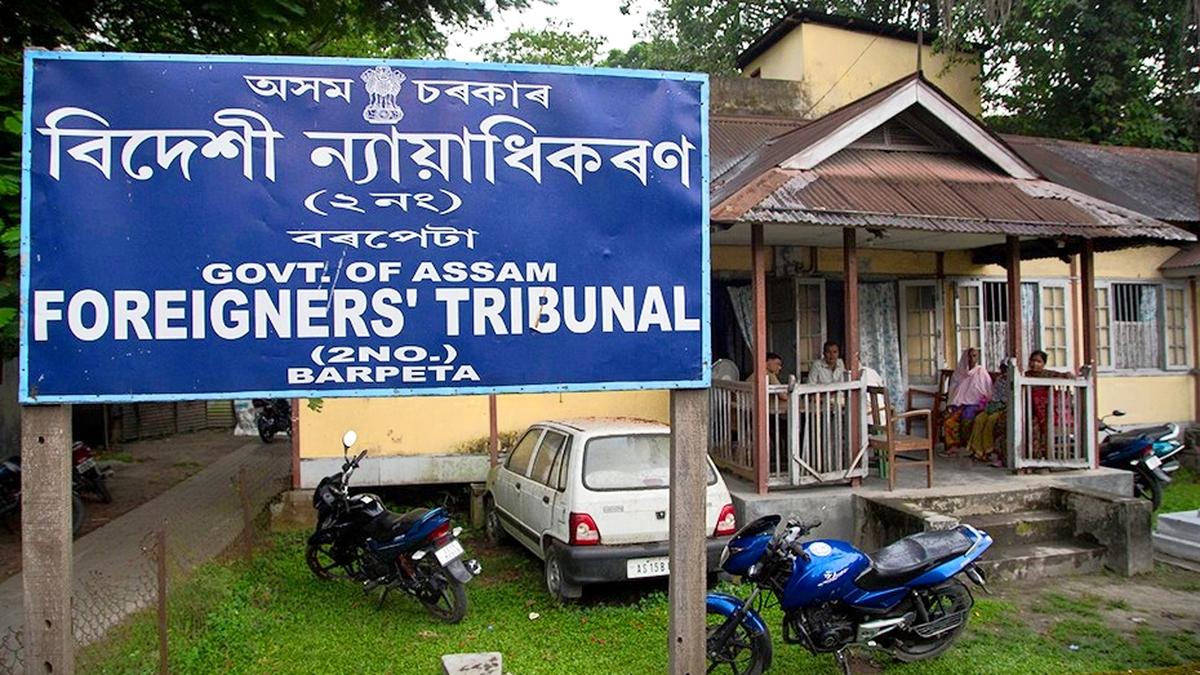
In this August 28, 2019 photo, people wait at the Foreigners’ Tribunal office at Barpeta in Assam. Only 26 declared foreigners have been deported since 2017 – despite the fact that, as of December 31, 2023, over 1,59,353 people had been declared foreigners by the State’s Foreigners’ Tribunals.
| Photo Credit: AP
In India, people who are deemed non-citizens can be detained under the National Security Act, 1980, and the Foreigners Act, 1946. Detained non-citizens can spend years in detention camps, enduring uncertainty and harsh conditions.
The Assam experience
In Assam, 19 lakh people have been stripped of their citizenship in the compilation of the National Register of Citizens (NRC). Many people stripped of their citizenship through this process have been detained. Most of these ‘non-citizens’ cannot be removed from India – because they have lived their entire lives in India, with no meaningful or continuing ties to any other nation. They were stripped of their citizenship through unfair procedures. They were required to prove their citizenship through documentary proof of their family’s residence in India before 1971, even though these documents are inaccessible to many and may be lost or destroyed in flood-prone Assam. Many of their documents were rejected because of misspellings or different versions of names, even though variations like this are common throughout India.
The arbitrary and indefinite detention of non-citizens in India, including those who have been stripped of citizenship by the NRC, was challenged in the Supreme Court in Rajubala Das v Union of India (2020). Similar proceedings in Australia in NZYQ v Ministerfor Immigration, Citizenship and Multicultural Affairs (2023) led the High Court to prohibit the indefinite detention of non-citizens where there is no realistic prospect of their removal from Australia, upholding important constitutional limits on the deprivation of liberty. Whether there are similar limits on India’s ability to detain non-citizens has important implications for the rule of law and the judiciary’s independence.
In Indian law, the principal basis for depriving a person of their liberty — even if it is not the only basis — is where that person has been found guilty of a criminal offence and sentenced by a court, or where they have been detained pending trial and sentence. That is, they have been detained by, or in connection with, the exercise of judicial power.
Being deprived of liberty is hence ordinarily a form of punishment. There are some reasons why a person may be detained other than as punishment; the most obvious example is preventive detention under Article 22 of the Constitution. But it is an important part of India’s common law heritage, as in Australia, that these purposes are limited and constrained, including under Article 22 itself. A person cannot be detained for any reason whatsoever. There are also some circumstances in Indian law where judicial power may be exercised by a body other than the courts, such as by tribunals. But the power to detain is under the control and supervision of the nation’s courts.
A violation of principles
Non-citizen detention in its current form in Assam violates these principles. Those detained have not been convicted of or charged with any crime or sentenced to any term of imprisonment. It cannot seriously be claimed that they are being detained for the purpose of removing them from India. In response to questions asked in the Assam Legislative Assembly, it was acknowledged that only 26 declared foreigners have been deported since 2017 – despite the fact that, as of December 31, 2023, over 1,59,353 people had been declared foreigners by the State’s Foreigners Tribunals. More recently, the Centre has informed the Supreme Court that 13 more Bangladeshi nationals have been deported. But only a tiny fraction of those detained, much less those stripped of citizenship, has been removed from India. Most non-citizens detained cannot be removed because they are citizens of no other country, and no other country will accept them.
No legitimate reason
In recent orders in Rajubala Das, the Supreme Court has ordered that deportation be commenced even without verifying detainees’ addresses in the country to which they are being deported. This is no answer to this dilemma. In order to remove a detainee, their nationality will have to be verified and the country to which they are deported must to be willing to accept them. The detainees will have to be provided travel documents which will allow them to enter that country. But none of this can happen for detainees who have no other country to call home. In Australia, people in a similar position — that is, people who have no realistic possibility of being removed from Australia — cannot be detained, because their detention would not serve any legitimate purpose.
Non-citizens are hence not detained as punishment, or pending trial, or for removal from India, or for any other recognised ‘preventive’ purpose — or in accordance with any safeguard on preventive detention under Article 22 of the Constitution. They are merely detained for the purpose of being detained. That is not a recognised or legitimate reason for depriving a person of their liberty under Article 21, regardless of whether that person is a citizen or a non-citizen.
Assam’s immigration detention regime is hence not just a threat to the liberty and well-being of those caught up within it; it raises important questions of constitutional principle. The deprivation of liberty has traditionally been recognised as a power to be exercised and controlled by the courts.
If the executive and the legislature encroach upon the traditional role of the courts, this poses a real threat to the rule of law.
Douglas McDonald-Norman, PhD candidate at the University of New South Wales
Published – May 06, 2025 01:53 am IST
